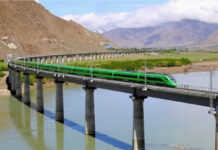Pakistan’s government announced the appointment of General Asim Munir as the new Army chief on Friday. General Sahir Shamshad Mirza was appointed Chairman of the Joint Chiefs of Staff Committee. The army chief’s appointment is always watched with enormous interest in that country which has been ruled by the military directly or indirectly for most of its existence. Despite the outgoing Chief General Bajwa’s claim that “We have restricted the Army’s role to its constitutionally mandated task only by deciding to make it ‘apolitical’”, the change in command is anything but that. The tussle underlines this between the Pakistan Democratic Movement (PDM) government and PTI for the past few months.
By Amb D P Srivastava
When in opposition, PDM was determined to bring down Imran Khan’s government before the change takes place at the helm of the Army command. This was to deny him a chance to appoint the new chief and consolidate his position before the next elections. Imran Khan assumed the same role once he lost power and tried to delay the succession till the elections are over. Now that the change has been decided, he has to accept the fait accompli. This was accompanied by another setback. Imran Khan called off the Long March and announced that his party will resign its seats in the provincial assemblies. The final decision will however be taken with the approval of his party.
While Imran Khan’s motives were political, Prime Minister Shehbaz Sharif’s actions were no less so. He picked up the General for the top position who was removed earlier from the ISI Chief’s post at the insistence of the then Prime Minister Imran Khan. In choosing him, Sharifs have sought to buy political insurance for the regime. The transition is being made at a time when Pakistan is facing a dire economic crisis and the after-effects of unprecedented floods in the country which have rendered 30 million persons homeless.
There are Pakistan Tehreek-e-Insaf (PTI) governments in Punjab and Khyber-Pakhtunkhwa. In addition, the party is in power in POK and Gilgit-Baltistan. Pakistan tightly controls these two territories, though they are not part of Pakistan according to its constitution. Imran Khan’s decision to resign the assembly seats, if ratified by his party, will essentially affect the political situation within Punjab and KP. Will he be in a hurry to lose his power base in two major provinces? The resignation of PTI members from State Assemblies may not necessarily bring down the government at the Federal level. This could become a double jeopardy. According to an editorial by the Jang, the announcement is simply a face-saving for the PTI leader to persuade his followers to accept calling off the Long March.
Shehbaz Sharif’s government is unlikely to agree to bring forward the elections scheduled for 2023. Elections at this stage will go against the PDM government. Imran Khan is drawing large crowds. They would like to wait till the economic situation improves. Pakistan is receiving the 22nd package of IMF assistance. The austerity package insisted upon by the IMF is bound to invite social anger. The last round of belt-tightening cost PML (N) a loss of 20 seats in Punjab bye-elections. Punjab is its home base. The return of the elder Sharif from England may not necessarily change this equation. The economic situation is unlikely to improve between now and next year. By eagerly ousting Imran Khan from Islamabad, the PDM government has assumed political liability.
Pakistan’s current account deficit shrank in October. But this improvement was based on an 11.6 % fall in imports. This will impact customs duty realization which is one of the main sources of the Pakistan government’s revenue. The exports rose by 2.6%, but this is not sufficient to offset the fall of remittances by more than 8.6 %. In the past, remittances have kept the current account deficit in check.
Pakistan government’s budget for the current year was based on a GDP growth of 5%. The budget follows July to June cycle and was presented in late June. The IMF report lowered this figure to 3.5%. This was based on the 7th and 8th rounds of review under IMF’s ongoing Extended Finance Facility for Pakistan. Though the IMF report was released after the massive floods of September, it did not take into account the impact of the floods on the economy and the government budget. The latest report of the State Bank of Pakistan which is its central bank has lowered the estimate of GDP growth further to 2 %. This is bound to affect the revenue projections which were the basis of higher growth estimates made by the government. It will affect the fiscal deficit adversely.
Prime Minister Shehbaz Sharif made quick trips to Saudi Arabia and China after assuming power. The purpose of the visits was to improve relations with two of Pakistan’s principal backers. Though the atmospherics have improved, neither has offered substantial financial assistance. Pakistan has proved an unreliable ally to the Gulf monarchies. The Saudi rulers may not have forgotten that Pakistan stood aside when the Kingdom wanted troops for Yemen. The decision was taken under the previous Sharif dispensation. It remains a close follower of China’s position. PM Shehbaz Sharif during his recent trip to Beijing endorsed Chinese positions across the range from Tibet, Hong Kong to recent tensions in Taiwan Strait.
China is Pakistan’s largest lender with $ 23 billion of debt owed to the country. Before Shehbaz Sharif’s visit, there was an expectation in the press that some debt relief will be announced. The joint statement issued after the visit mentions a paltry figure of 500 million Yuan ($ 70 million) . Saudi Arabia has given some support in terms of oil purchases. China may also give some relief. But they are unlikely to make a substantial commitment on a stand-alone basis. They want IMF to be involved. This is partly to minimize their risks and partly because IMF’s involvement ensures some financial discipline.
Pakistan has projected flood damages at more than $ 30 billion. The recently concluded Sharm el-Sheikh Summit has agreed to ‘consider’ establishing financing arrangements to cover Loss and Damage on account of climate change. Though this may be a step forward, this is unlikely to bring any tangible relief immediately. The Summit has appointed a committee to go into the question of sources of funding and the beneficiaries.
The presence of 30 million people rendered homeless poses a major source of socio-economic discontent. The scale is unprecedented. Though the plight of its poor may not figure very high in the calculations of Pakistan’s elite, this has fundamentally changed the dynamics which used to revolve around the changing power equations at the top. This will also be the feeding ground for the religious parties who had improved their vote share in the last national elections in 2018 from 5.8 % to 9 %. This, more than the appointment of the new army chief, is critical to the future direction of Pakistan.
This article first appeared in www.vifindia.org and it belongs to them.








